HLSC220: Debate - Justice Requires Increased Aged Care Spending
VerifiedAdded on 2022/11/22
|7
|1417
|168
Report
AI Summary
This document presents a student's contribution to a debate centered on the ethical proposition that justice necessitates increased spending on aged care services. The affirmative team argues that increased funding is essential for improving the quality of care, ensuring a healthy environment, and providing well-trained staff to support the elderly. They emphasize the importance of privacy, dignity, and autonomy for elders, facilitated by new facilities and dedicated healthcare professionals. The rebuttal addresses counterarguments, highlighting the necessity of funding for healthy food, infrastructure, and specialized care to prevent communicable diseases. The summary reinforces the need for increased investment to maintain well-being, close gaps in aged healthcare, and guarantee equal access to quality healthcare for all elders, irrespective of their socioeconomic status or health condition. The debate concludes by affirming that increased investment is crucial for a respectful, healthy, and harmonious life for the elderly until their final days.
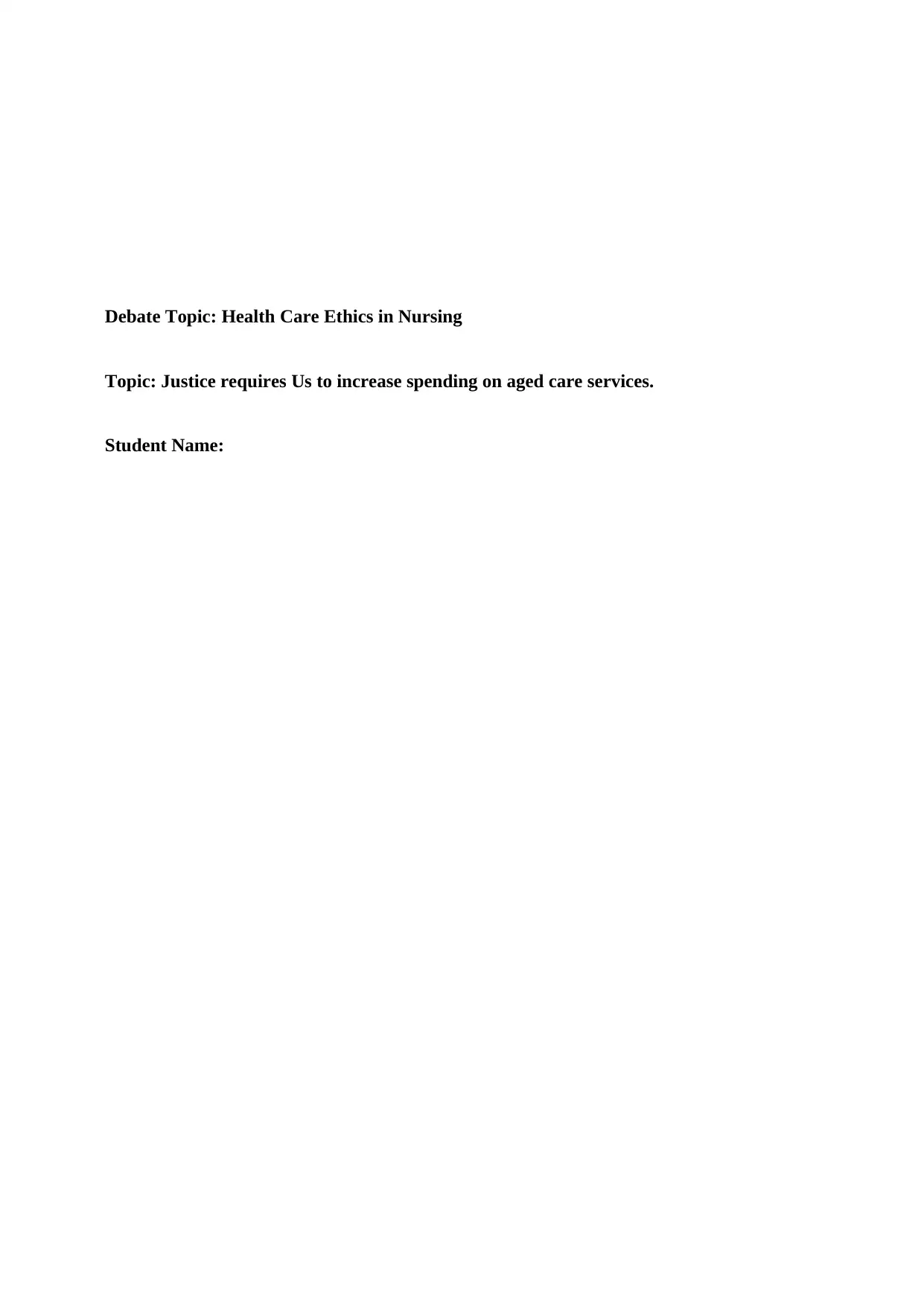
Debate Topic: Health Care Ethics in Nursing
Topic: Justice requires Us to increase spending on aged care services.
Student Name:
Topic: Justice requires Us to increase spending on aged care services.
Student Name:
Paraphrase This Document
Need a fresh take? Get an instant paraphrase of this document with our AI Paraphraser
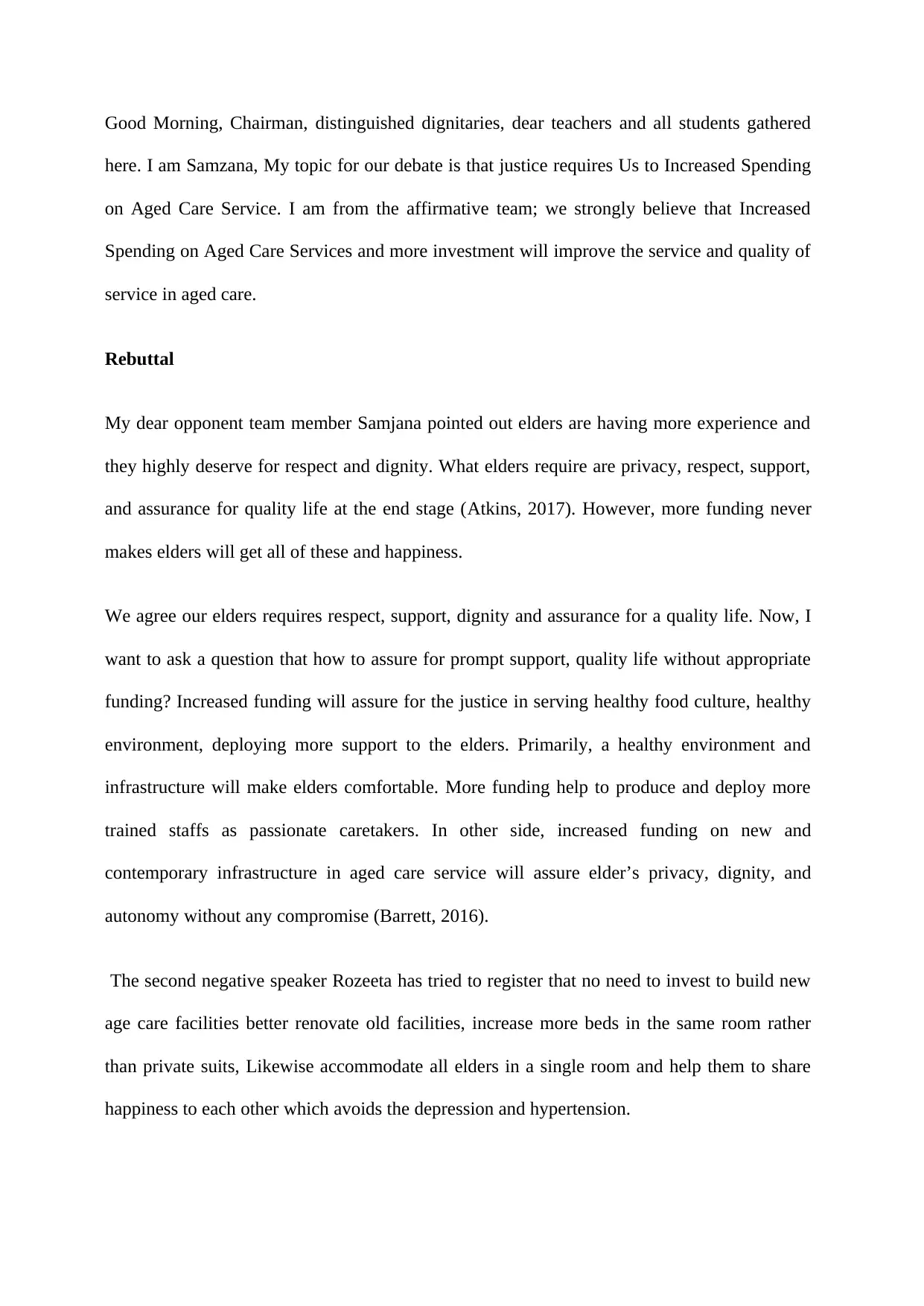
Good Morning, Chairman, distinguished dignitaries, dear teachers and all students gathered
here. I am Samzana, My topic for our debate is that justice requires Us to Increased Spending
on Aged Care Service. I am from the affirmative team; we strongly believe that Increased
Spending on Aged Care Services and more investment will improve the service and quality of
service in aged care.
Rebuttal
My dear opponent team member Samjana pointed out elders are having more experience and
they highly deserve for respect and dignity. What elders require are privacy, respect, support,
and assurance for quality life at the end stage (Atkins, 2017). However, more funding never
makes elders will get all of these and happiness.
We agree our elders requires respect, support, dignity and assurance for a quality life. Now, I
want to ask a question that how to assure for prompt support, quality life without appropriate
funding? Increased funding will assure for the justice in serving healthy food culture, healthy
environment, deploying more support to the elders. Primarily, a healthy environment and
infrastructure will make elders comfortable. More funding help to produce and deploy more
trained staffs as passionate caretakers. In other side, increased funding on new and
contemporary infrastructure in aged care service will assure elder’s privacy, dignity, and
autonomy without any compromise (Barrett, 2016).
The second negative speaker Rozeeta has tried to register that no need to invest to build new
age care facilities better renovate old facilities, increase more beds in the same room rather
than private suits, Likewise accommodate all elders in a single room and help them to share
happiness to each other which avoids the depression and hypertension.
here. I am Samzana, My topic for our debate is that justice requires Us to Increased Spending
on Aged Care Service. I am from the affirmative team; we strongly believe that Increased
Spending on Aged Care Services and more investment will improve the service and quality of
service in aged care.
Rebuttal
My dear opponent team member Samjana pointed out elders are having more experience and
they highly deserve for respect and dignity. What elders require are privacy, respect, support,
and assurance for quality life at the end stage (Atkins, 2017). However, more funding never
makes elders will get all of these and happiness.
We agree our elders requires respect, support, dignity and assurance for a quality life. Now, I
want to ask a question that how to assure for prompt support, quality life without appropriate
funding? Increased funding will assure for the justice in serving healthy food culture, healthy
environment, deploying more support to the elders. Primarily, a healthy environment and
infrastructure will make elders comfortable. More funding help to produce and deploy more
trained staffs as passionate caretakers. In other side, increased funding on new and
contemporary infrastructure in aged care service will assure elder’s privacy, dignity, and
autonomy without any compromise (Barrett, 2016).
The second negative speaker Rozeeta has tried to register that no need to invest to build new
age care facilities better renovate old facilities, increase more beds in the same room rather
than private suits, Likewise accommodate all elders in a single room and help them to share
happiness to each other which avoids the depression and hypertension.
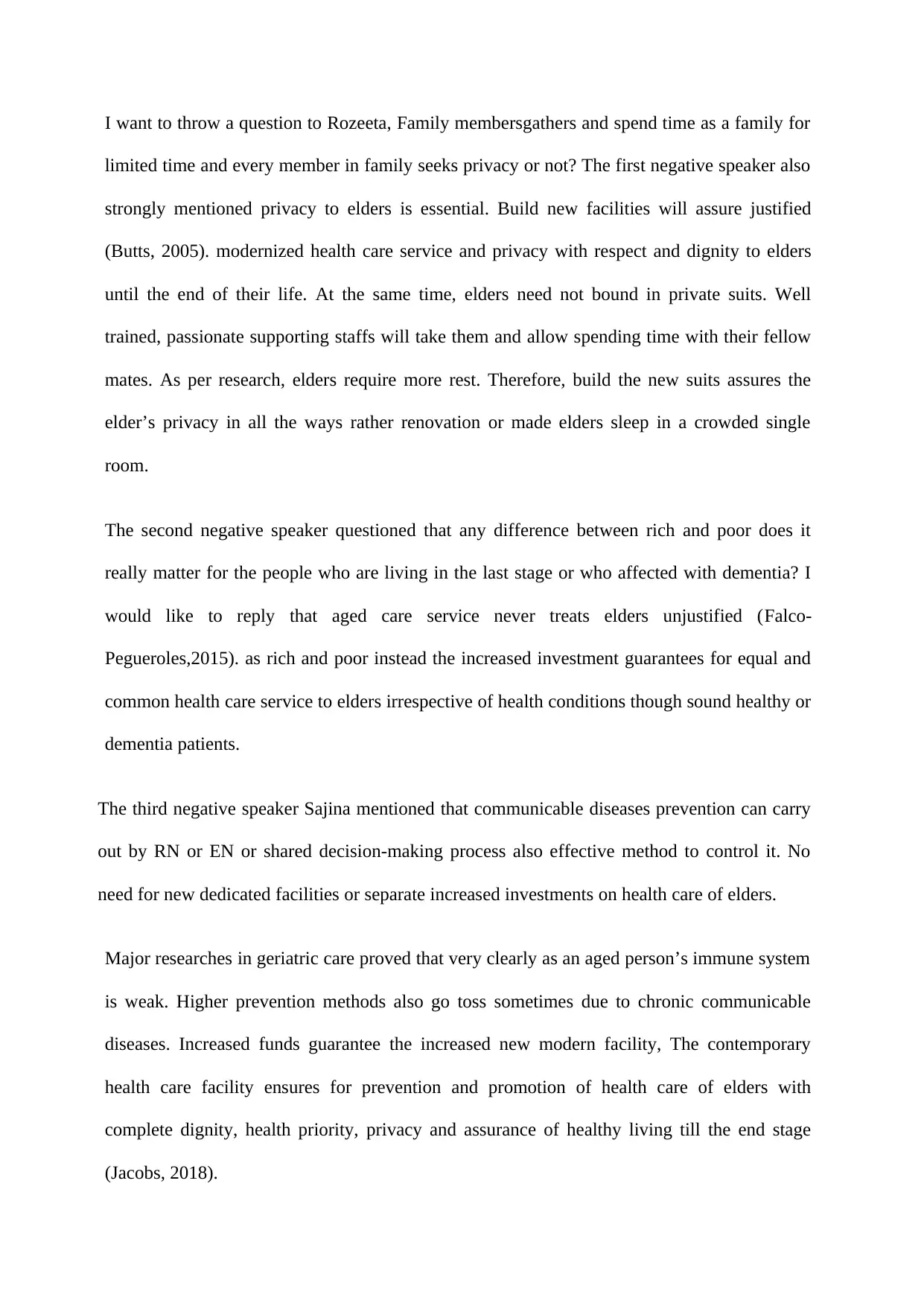
I want to throw a question to Rozeeta, Family membersgathers and spend time as a family for
limited time and every member in family seeks privacy or not? The first negative speaker also
strongly mentioned privacy to elders is essential. Build new facilities will assure justified
(Butts, 2005). modernized health care service and privacy with respect and dignity to elders
until the end of their life. At the same time, elders need not bound in private suits. Well
trained, passionate supporting staffs will take them and allow spending time with their fellow
mates. As per research, elders require more rest. Therefore, build the new suits assures the
elder’s privacy in all the ways rather renovation or made elders sleep in a crowded single
room.
The second negative speaker questioned that any difference between rich and poor does it
really matter for the people who are living in the last stage or who affected with dementia? I
would like to reply that aged care service never treats elders unjustified (Falco-
Pegueroles,2015). as rich and poor instead the increased investment guarantees for equal and
common health care service to elders irrespective of health conditions though sound healthy or
dementia patients.
The third negative speaker Sajina mentioned that communicable diseases prevention can carry
out by RN or EN or shared decision-making process also effective method to control it. No
need for new dedicated facilities or separate increased investments on health care of elders.
Major researches in geriatric care proved that very clearly as an aged person’s immune system
is weak. Higher prevention methods also go toss sometimes due to chronic communicable
diseases. Increased funds guarantee the increased new modern facility, The contemporary
health care facility ensures for prevention and promotion of health care of elders with
complete dignity, health priority, privacy and assurance of healthy living till the end stage
(Jacobs, 2018).
limited time and every member in family seeks privacy or not? The first negative speaker also
strongly mentioned privacy to elders is essential. Build new facilities will assure justified
(Butts, 2005). modernized health care service and privacy with respect and dignity to elders
until the end of their life. At the same time, elders need not bound in private suits. Well
trained, passionate supporting staffs will take them and allow spending time with their fellow
mates. As per research, elders require more rest. Therefore, build the new suits assures the
elder’s privacy in all the ways rather renovation or made elders sleep in a crowded single
room.
The second negative speaker questioned that any difference between rich and poor does it
really matter for the people who are living in the last stage or who affected with dementia? I
would like to reply that aged care service never treats elders unjustified (Falco-
Pegueroles,2015). as rich and poor instead the increased investment guarantees for equal and
common health care service to elders irrespective of health conditions though sound healthy or
dementia patients.
The third negative speaker Sajina mentioned that communicable diseases prevention can carry
out by RN or EN or shared decision-making process also effective method to control it. No
need for new dedicated facilities or separate increased investments on health care of elders.
Major researches in geriatric care proved that very clearly as an aged person’s immune system
is weak. Higher prevention methods also go toss sometimes due to chronic communicable
diseases. Increased funds guarantee the increased new modern facility, The contemporary
health care facility ensures for prevention and promotion of health care of elders with
complete dignity, health priority, privacy and assurance of healthy living till the end stage
(Jacobs, 2018).
⊘ This is a preview!⊘
Do you want full access?
Subscribe today to unlock all pages.

Trusted by 1+ million students worldwide
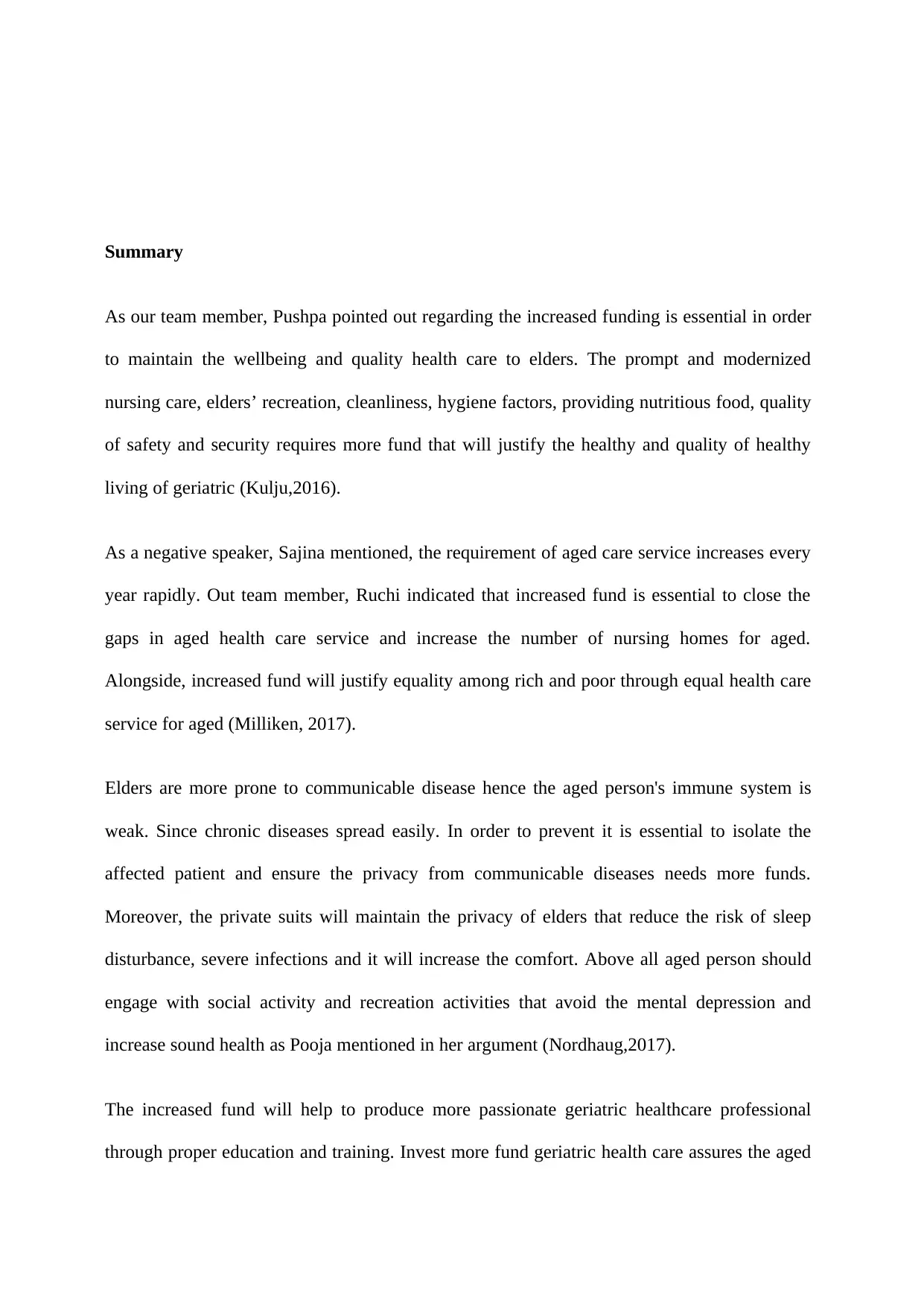
Summary
As our team member, Pushpa pointed out regarding the increased funding is essential in order
to maintain the wellbeing and quality health care to elders. The prompt and modernized
nursing care, elders’ recreation, cleanliness, hygiene factors, providing nutritious food, quality
of safety and security requires more fund that will justify the healthy and quality of healthy
living of geriatric (Kulju,2016).
As a negative speaker, Sajina mentioned, the requirement of aged care service increases every
year rapidly. Out team member, Ruchi indicated that increased fund is essential to close the
gaps in aged health care service and increase the number of nursing homes for aged.
Alongside, increased fund will justify equality among rich and poor through equal health care
service for aged (Milliken, 2017).
Elders are more prone to communicable disease hence the aged person's immune system is
weak. Since chronic diseases spread easily. In order to prevent it is essential to isolate the
affected patient and ensure the privacy from communicable diseases needs more funds.
Moreover, the private suits will maintain the privacy of elders that reduce the risk of sleep
disturbance, severe infections and it will increase the comfort. Above all aged person should
engage with social activity and recreation activities that avoid the mental depression and
increase sound health as Pooja mentioned in her argument (Nordhaug,2017).
The increased fund will help to produce more passionate geriatric healthcare professional
through proper education and training. Invest more fund geriatric health care assures the aged
As our team member, Pushpa pointed out regarding the increased funding is essential in order
to maintain the wellbeing and quality health care to elders. The prompt and modernized
nursing care, elders’ recreation, cleanliness, hygiene factors, providing nutritious food, quality
of safety and security requires more fund that will justify the healthy and quality of healthy
living of geriatric (Kulju,2016).
As a negative speaker, Sajina mentioned, the requirement of aged care service increases every
year rapidly. Out team member, Ruchi indicated that increased fund is essential to close the
gaps in aged health care service and increase the number of nursing homes for aged.
Alongside, increased fund will justify equality among rich and poor through equal health care
service for aged (Milliken, 2017).
Elders are more prone to communicable disease hence the aged person's immune system is
weak. Since chronic diseases spread easily. In order to prevent it is essential to isolate the
affected patient and ensure the privacy from communicable diseases needs more funds.
Moreover, the private suits will maintain the privacy of elders that reduce the risk of sleep
disturbance, severe infections and it will increase the comfort. Above all aged person should
engage with social activity and recreation activities that avoid the mental depression and
increase sound health as Pooja mentioned in her argument (Nordhaug,2017).
The increased fund will help to produce more passionate geriatric healthcare professional
through proper education and training. Invest more fund geriatric health care assures the aged
Paraphrase This Document
Need a fresh take? Get an instant paraphrase of this document with our AI Paraphraser
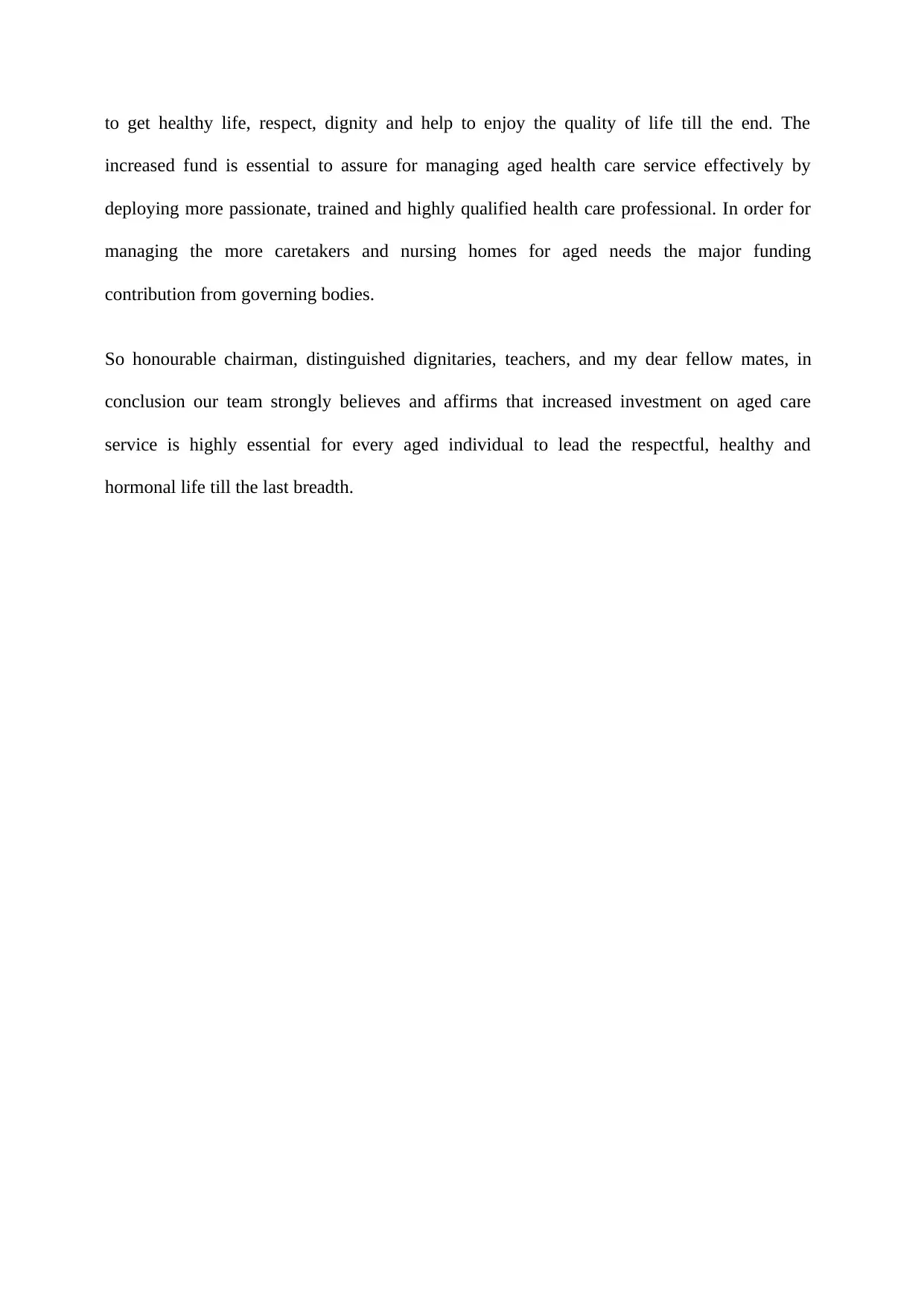
to get healthy life, respect, dignity and help to enjoy the quality of life till the end. The
increased fund is essential to assure for managing aged health care service effectively by
deploying more passionate, trained and highly qualified health care professional. In order for
managing the more caretakers and nursing homes for aged needs the major funding
contribution from governing bodies.
So honourable chairman, distinguished dignitaries, teachers, and my dear fellow mates, in
conclusion our team strongly believes and affirms that increased investment on aged care
service is highly essential for every aged individual to lead the respectful, healthy and
hormonal life till the last breadth.
increased fund is essential to assure for managing aged health care service effectively by
deploying more passionate, trained and highly qualified health care professional. In order for
managing the more caretakers and nursing homes for aged needs the major funding
contribution from governing bodies.
So honourable chairman, distinguished dignitaries, teachers, and my dear fellow mates, in
conclusion our team strongly believes and affirms that increased investment on aged care
service is highly essential for every aged individual to lead the respectful, healthy and
hormonal life till the last breadth.
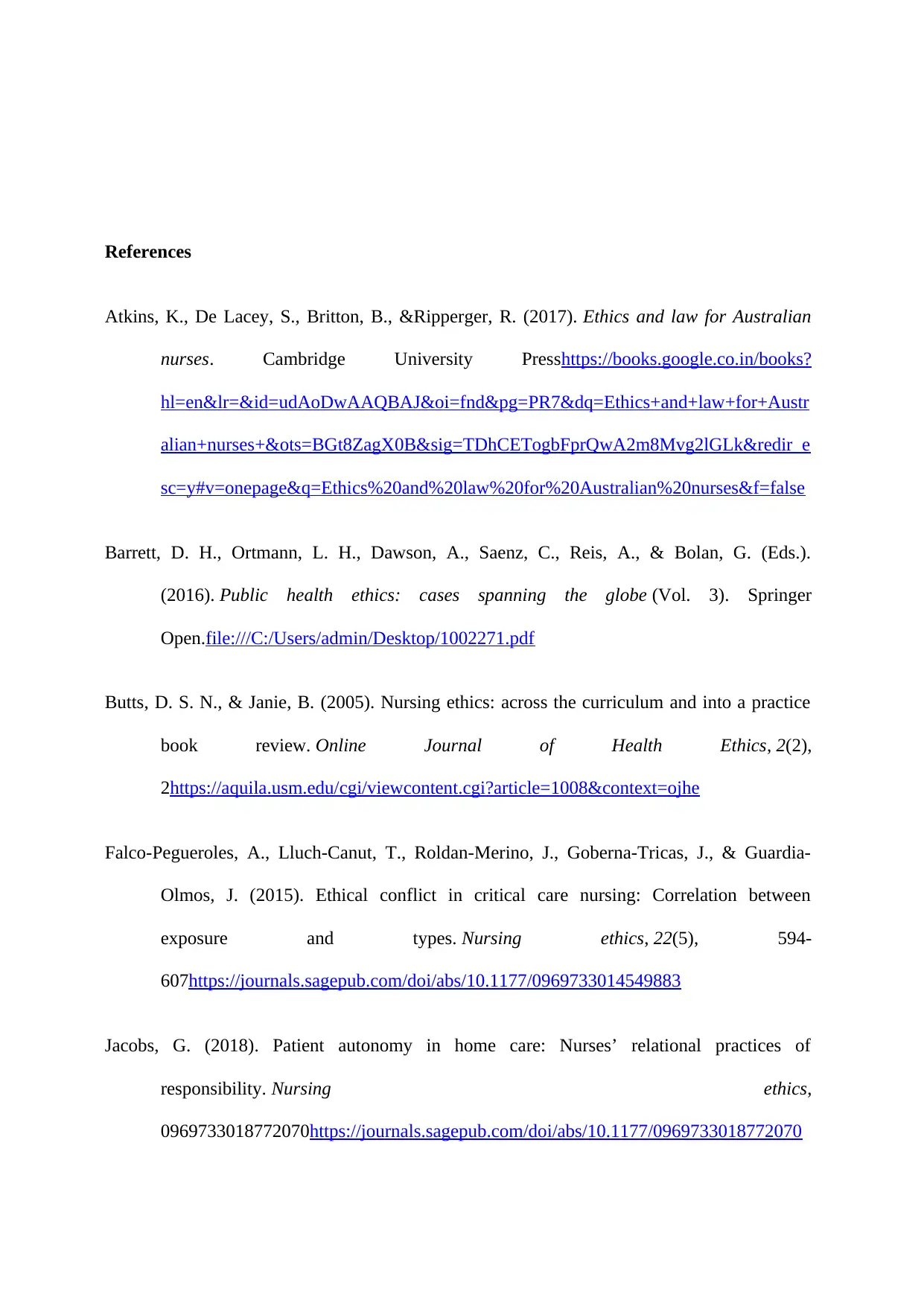
References
Atkins, K., De Lacey, S., Britton, B., &Ripperger, R. (2017). Ethics and law for Australian
nurses. Cambridge University Presshttps://books.google.co.in/books?
hl=en&lr=&id=udAoDwAAQBAJ&oi=fnd&pg=PR7&dq=Ethics+and+law+for+Austr
alian+nurses+&ots=BGt8ZagX0B&sig=TDhCETogbFprQwA2m8Mvg2lGLk&redir_e
sc=y#v=onepage&q=Ethics%20and%20law%20for%20Australian%20nurses&f=false
Barrett, D. H., Ortmann, L. H., Dawson, A., Saenz, C., Reis, A., & Bolan, G. (Eds.).
(2016). Public health ethics: cases spanning the globe (Vol. 3). Springer
Open.file:///C:/Users/admin/Desktop/1002271.pdf
Butts, D. S. N., & Janie, B. (2005). Nursing ethics: across the curriculum and into a practice
book review. Online Journal of Health Ethics, 2(2),
2https://aquila.usm.edu/cgi/viewcontent.cgi?article=1008&context=ojhe
Falco-Pegueroles, A., Lluch-Canut, T., Roldan-Merino, J., Goberna-Tricas, J., & Guardia-
Olmos, J. (2015). Ethical conflict in critical care nursing: Correlation between
exposure and types. Nursing ethics, 22(5), 594-
607https://journals.sagepub.com/doi/abs/10.1177/0969733014549883
Jacobs, G. (2018). Patient autonomy in home care: Nurses’ relational practices of
responsibility. Nursing ethics,
0969733018772070https://journals.sagepub.com/doi/abs/10.1177/0969733018772070
Atkins, K., De Lacey, S., Britton, B., &Ripperger, R. (2017). Ethics and law for Australian
nurses. Cambridge University Presshttps://books.google.co.in/books?
hl=en&lr=&id=udAoDwAAQBAJ&oi=fnd&pg=PR7&dq=Ethics+and+law+for+Austr
alian+nurses+&ots=BGt8ZagX0B&sig=TDhCETogbFprQwA2m8Mvg2lGLk&redir_e
sc=y#v=onepage&q=Ethics%20and%20law%20for%20Australian%20nurses&f=false
Barrett, D. H., Ortmann, L. H., Dawson, A., Saenz, C., Reis, A., & Bolan, G. (Eds.).
(2016). Public health ethics: cases spanning the globe (Vol. 3). Springer
Open.file:///C:/Users/admin/Desktop/1002271.pdf
Butts, D. S. N., & Janie, B. (2005). Nursing ethics: across the curriculum and into a practice
book review. Online Journal of Health Ethics, 2(2),
2https://aquila.usm.edu/cgi/viewcontent.cgi?article=1008&context=ojhe
Falco-Pegueroles, A., Lluch-Canut, T., Roldan-Merino, J., Goberna-Tricas, J., & Guardia-
Olmos, J. (2015). Ethical conflict in critical care nursing: Correlation between
exposure and types. Nursing ethics, 22(5), 594-
607https://journals.sagepub.com/doi/abs/10.1177/0969733014549883
Jacobs, G. (2018). Patient autonomy in home care: Nurses’ relational practices of
responsibility. Nursing ethics,
0969733018772070https://journals.sagepub.com/doi/abs/10.1177/0969733018772070
⊘ This is a preview!⊘
Do you want full access?
Subscribe today to unlock all pages.

Trusted by 1+ million students worldwide
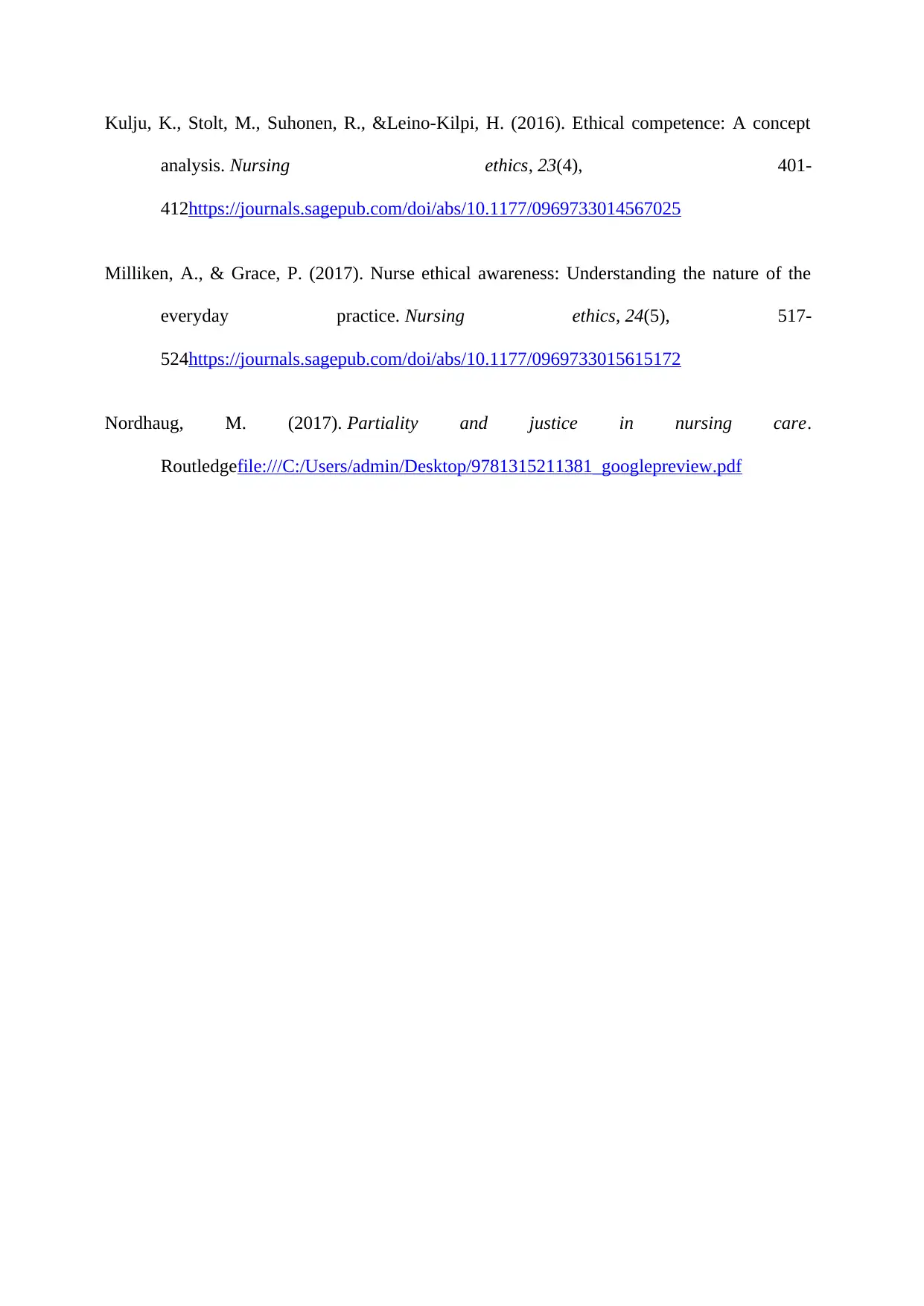
Kulju, K., Stolt, M., Suhonen, R., &Leino-Kilpi, H. (2016). Ethical competence: A concept
analysis. Nursing ethics, 23(4), 401-
412https://journals.sagepub.com/doi/abs/10.1177/0969733014567025
Milliken, A., & Grace, P. (2017). Nurse ethical awareness: Understanding the nature of the
everyday practice. Nursing ethics, 24(5), 517-
524https://journals.sagepub.com/doi/abs/10.1177/0969733015615172
Nordhaug, M. (2017). Partiality and justice in nursing care.
Routledgefile:///C:/Users/admin/Desktop/9781315211381_googlepreview.pdf
analysis. Nursing ethics, 23(4), 401-
412https://journals.sagepub.com/doi/abs/10.1177/0969733014567025
Milliken, A., & Grace, P. (2017). Nurse ethical awareness: Understanding the nature of the
everyday practice. Nursing ethics, 24(5), 517-
524https://journals.sagepub.com/doi/abs/10.1177/0969733015615172
Nordhaug, M. (2017). Partiality and justice in nursing care.
Routledgefile:///C:/Users/admin/Desktop/9781315211381_googlepreview.pdf
1 out of 7
Your All-in-One AI-Powered Toolkit for Academic Success.
+13062052269
info@desklib.com
Available 24*7 on WhatsApp / Email
![[object Object]](/_next/static/media/star-bottom.7253800d.svg)
Unlock your academic potential
Copyright © 2020–2026 A2Z Services. All Rights Reserved. Developed and managed by ZUCOL.


